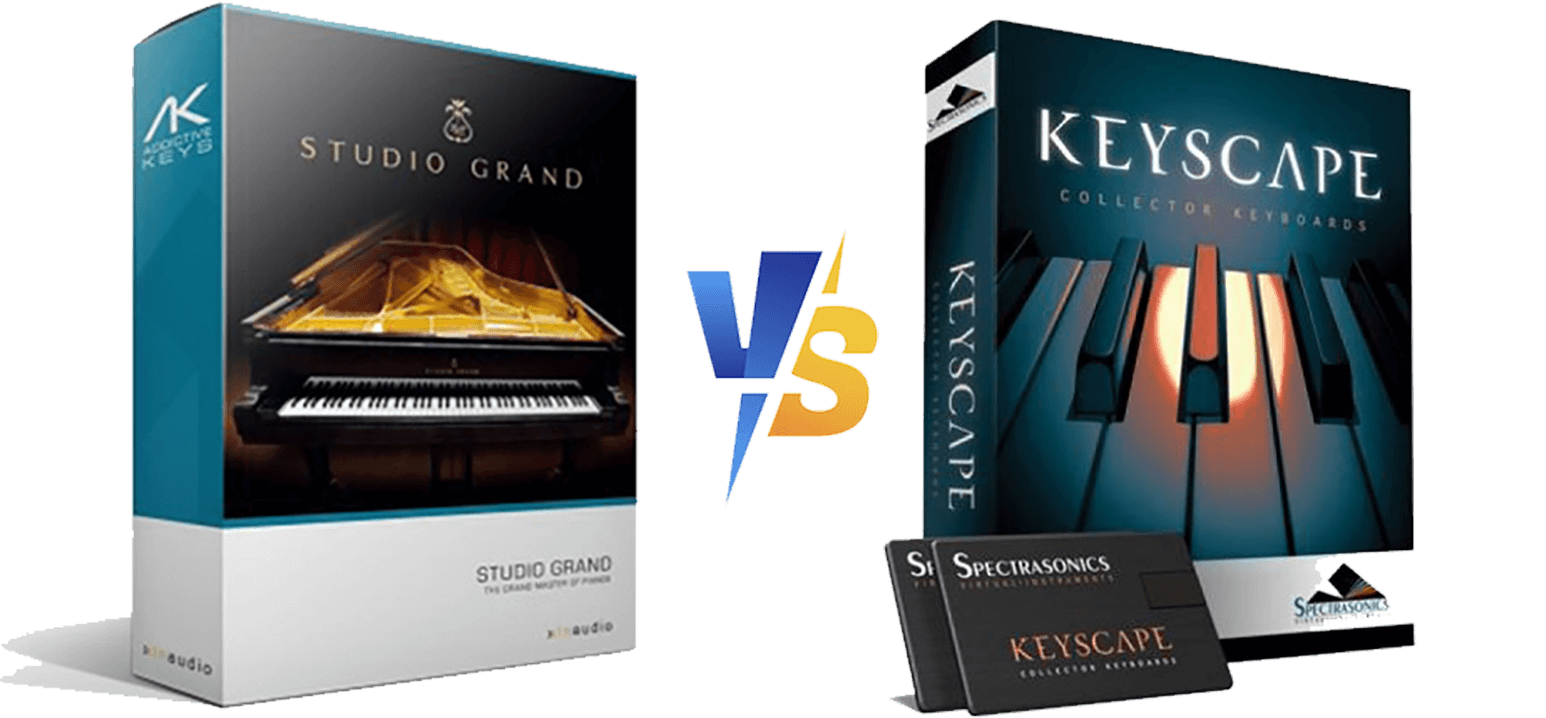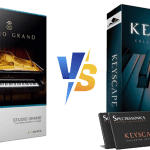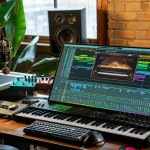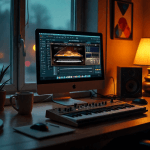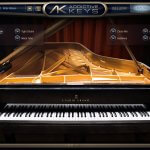Which Virtual Piano Fits Your Studio?
If you’re shopping for a high-quality virtual piano, you’ve likely stumbled upon two top contenders: XLN Audio’s Addictive Keys Studio Grand and Spectrasonics’ Keyscape. Both deliver professional-grade sounds, but they serve very different roles in a producer’s toolkit. Understanding the real-world differences between Addictive Keys vs Keyscape can save you time, money, and CPU headaches.
Rather than declaring a “winner,” this comparison cuts through the marketing to show which plugin aligns with your workflow, budget, and creative goals. Whether you’re scoring films, writing pop songs, or just starting out, knowing the strengths of each will help you choose wisely.
Addictive Keys vs Keyscape: Core Philosophy
The biggest distinction lies in their design philosophy.
Addictive Keys Studio Grand focuses on one thing: a pristine, studio-ready Steinway Model D grand piano. At just 4GB, it’s lean, fast, and built for producers who need a reliable piano sound without distractions. There’s no clutter—just a single instrument optimized for modern production.
Keyscape, by contrast, is a 75GB library housing 36 rare and vintage keyboard instruments—not just grands, but Rhodes, Wurlitzers, clavinets, celestas, harpsichords, and even obscure gems like the Hohner Pianet. It’s less a piano plugin and more a curated archive of keyboard history.
So when comparing Addictive Keys vs Keyscape, ask: Do you need one excellent piano or an entire keyboard collection?
Sound Quality: Realism vs Practicality
Both plugins sound fantastic—but in different contexts.
Keyscape’s LA Custom C7 grand is renowned for its hyper-realistic detail. You’ll hear pedal thumps, string resonance, hammer noise, and subtle key release artifacts that make it feel alive. For solo piano recordings or cinematic scores where nuance matters, it’s hard to beat.
Addictive Keys, however, prioritizes mix-ready clarity. Its Steinway tone is warm, balanced, and sits perfectly in pop, rock, or electronic arrangements without extra EQ or compression. It may lack Keyscape’s microscopic realism, but it delivers a polished sound that works immediately—ideal for fast-paced sessions.
In short: Keyscape excels in authenticity; Addictive Keys wins in practicality.
Interface & Workflow: Speed vs Purity
Workflow is where these plugins diverge sharply.
Addictive Keys features a clean, intuitive interface with built-in effects: EQ, compression, chorus, phaser, and tempo-synced reverb/delay. You can shape your tone without leaving the plugin—perfect for songwriters who want to stay in the creative zone.
Keyscape takes a minimalist approach. Its UI is stripped down to preserve sonic integrity, with no onboard modulation or distortion. Want to add grit or movement? You’ll need external plugins. This purity appeals to purists but slows down quick sketching or genre-blending.
If your priority is speed and flexibility, Addictive Keys vs Keyscape isn’t close—Addictive Keys wins for workflow efficiency.
Performance & System Demands
Let’s talk real-world usability.
Addictive Keys is lightweight: 4GB install, fast loading, and gentle on CPU. It runs smoothly on laptops and mid-range systems, making it ideal for mobile producers or live performers.
Keyscape, however, is resource-intensive. With 75GB of samples and high polyphony, it demands 16GB+ RAM and a fast SSD to avoid glitches—especially in complex sessions or live setups. On older machines, it can stutter or crash.
For producers with modest rigs, this isn’t just a preference—it’s a dealbreaker. When evaluating Addictive Keys vs Keyscape, your computer specs may decide for you.
Best Use Cases by Genre
Not all music needs the same piano.
- Addictive Keys Studio Grand thrives in pop, rock, singer-songwriter, electronic, and film scoring where the piano supports other elements. Its built-in FX and mix-friendly tone make it versatile for modern production.
- Keyscape shines in film composition, jazz, classical, and experimental genres where texture, rarity, and expressive depth matter. Need a dusty upright for a noir scene or a vibraphone for ambient layers? Keyscape delivers.
Think of Addictive Keys as your dependable session player—and Keyscape as your multi-instrumentalist virtuoso.
Price & Value: What Are You Really Paying For?
Cost is often the final factor.
- Addictive Keys Studio Grand: $95 for a single instrument. Bundles (Duo: $155, Trio: $180) offer more variety at a fraction of Keyscape’s price. It’s one of the most affordable pro-grade piano VSTs available.
- Keyscape: $399. Yes, it’s expensive—but you’re getting 36 fully sampled instruments, many of which would cost $100+ individually. If you regularly use electric pianos, organs, or vintage keyboards, it’s a long-term investment.
So in the Addictive Keys vs Keyscape debate, value depends on your needs. One piano? Go budget-friendly. A full keyboard arsenal? Keyscape justifies its price.
Final Verdict: Who Should Choose What?
Neither plugin is universally “better.” The right choice depends entirely on your situation.
Choose Addictive Keys Studio Grand if you:
- Need a high-quality Steinway that loads fast and works on any system
- Are on a tight budget or just starting out
- Value built-in effects and quick workflow
- Produce pop, rock, or electronic music
Choose Spectrasonics Keyscape if you:
- Want access to 36 unique keyboard instruments
- Have a powerful computer (16GB+ RAM, SSD recommended)
- Work in film, jazz, or experimental music
- Prioritize sonic depth and historical authenticity
FAQs: Addictive Keys vs Keyscape
Is Keyscape worth it if I only want a piano?
No. At $399, it’s overkill for a single instrument. Consider Addictive Keys or other dedicated piano VSTs instead.
Does Addictive Keys have a free trial?
Yes—XLN Audio offers a free version so you can test the sound and interface.
Can Addictive Keys compete with Keyscape sonically?
For most modern productions, yes. It may lack ultra-detailed realism, but its tone is professional and mix-ready.
Do I need Omnisphere to run Keyscape?
No. Keyscape runs standalone, though it integrates with Omnisphere if you own it.
Which is better for live performance?
Addictive Keys—thanks to its low CPU usage and fast loading.
Is Addictive Keys good for beginners?
Absolutely. It’s affordable, easy to use, and sounds great with zero tweaking.
Ready to Choose Your Piano?
The Addictive Keys vs Keyscape decision comes down to your priorities: simplicity or scope, speed or depth, budget or breadth.
- Get Addictive Keys Studio Grand for a lightweight, affordable, and workflow-friendly piano.
- Explore Spectrasonics Keyscape if you’re ready to invest in a vast, expressive keyboard universe.
Whichever you pick, you’re getting a professional tool—just make sure it matches how you create.

